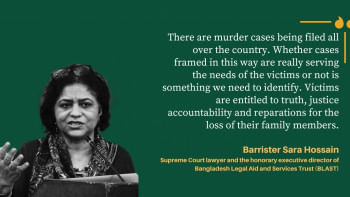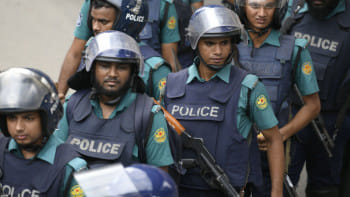A disturbing legal provision makes convicting law enforcers difficult

There is a provision of law in Bangladesh's Penal Code which could have a considerable impact upon the criminal prosecution of hundreds of students, protestors and onlookers killed by Awami League government law enforcement officials on July 16 and after.
Yet, very few people are talking about it.
It is section 76 of the Penal Code which is titled, "Act done by a person bound, or by mistake of fact believing himself bound, by law."
It states: "Nothing is an offence which is done by a person who is, or who by reason of a mistake of fact and not by reason of a mistake of law in good faith believes himself to be, bound by law to do it."
The wording is rather convoluted, and its meaning is not clear. The Penal Code however provides some "illustrations" to help with its application, and the first one reads:
"A, a soldier, fires on a mob by the order of his superior officer, in conformity with the commands of the law. A has committed no offence."
Law enforcement officers will inevitably seek to argue that they were ordered to fire on the protesters—ironically, a particular claim that prosecutors would also support—and so must be acquitted from the offence of murder.
The prosecution may argue that this illustration given in the Penal Code only refers to a "soldier," and so does not refer to a "police officer." However, when you had Border Guards of Bangladesh (which includes some military officers), police and in some situations, the army, all involved in shooting after July 16, can the law treat soldiers and police officers differently?
Prosecutors may also assert that the police did not act "in good faith" when they did the shooting, or that the firing was not "in conformity with the commands of the law."
It may also be possible to challenge the constitutionality of this provision which was drafted in colonial times, and no doubt was included with an intention to protect the British colonial police and army from being prosecuted. It could be argued, for example, that section 76 of the Penal Code violates the constitutional principle of the "right to life" though if the court gave such a ruling it is not clear whether it should retrospectively apply to the student protest killings particularly as the reason for the challenge was to remove a defence that the accused would otherwise have been able to use.
Such a ruling may also face resistance from the current Bangladesh Army as it would remove a protection provided to its soldiers and officers.
Nonetheless the provision, to the extent it remains unchallenged, will certainly be an obstacle for conviction, and prosecutors will need some clever legal minds to find a way of working around it so that it does not have a significant impact upon any trials that take place.
However, it should be noted, that those members of the Awami League's student or youth wings seen shooting at protestors, who were not formally part of any law enforcement entity, could not avail themselves of this defence were they to be prosecuted for murder.
This provision might not just have an impact on the prosecution of police on the ground but also those higher up the law enforcement or political food-chain alleged to be involved in ordering or inciting the killing, who could be prosecuted for "common intention" (section 34) or "abetment" (section 107).
This is because courts will not be able to convict a senior police officer or a politician for complicity in the murder unless a law enforcement officer is first convicted for the offence itself.
One possible way round this is to prosecute police officers and others in the country's International Crimes Tribunal for the offence of Crimes Against Humanity. This is because the offence of murder, as part of a Crime Against Humanity, is not defined in the International Crimes (Tribunal) Act 1973, and so this defence set out in Section 76 of the Penal Code does not apply.
However, there are many problems with the International Crimes Tribunal—as were very evident during the trials of those accused of crimes committed during the 1971 war—and any attempt to prosecute people in that court for international crimes would not only require considerable amendment of the procedures, but also a change in the offence of Crimes Against Humanity in order to ensure that it matched the offence set out internationally.
The ICT, as a forum of prosecution, however very much requires its own separate consideration. That is a matter for another day.
David Bergman is a journalist and can be followed on X (formerly Twitter)@TheDavidBergman
Views expressed in this article are the author's own.
Follow The Daily Star Opinion on Facebook for the latest opinions, commentaries and analyses by experts and professionals. To contribute your article or letter to The Daily Star Opinion, see our guidelines for submission.

 For all latest news, follow The Daily Star's Google News channel.
For all latest news, follow The Daily Star's Google News channel. 










Comments